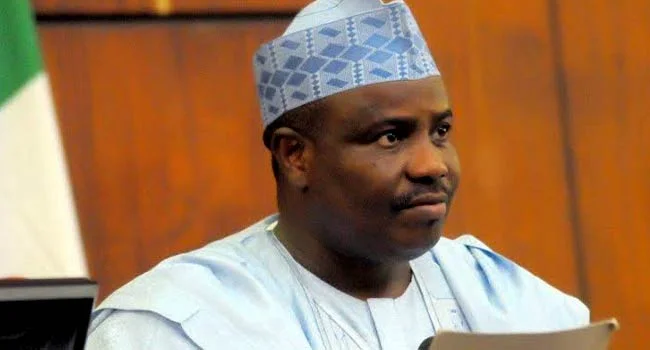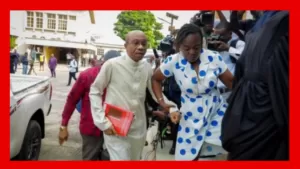EFCC Detains Former Sokoto Governor Aminu Tambuwal Over Alleged ₦189 Billion Fraud

The Economic and Financial Crimes Commission (EFCC) has detained Aminu Waziri Tambuwal, the former governor of Sokoto State and current senator representing Sokoto South, over allegations of orchestrating fraudulent cash withdrawals amounting to ₦189 billion during his eight-year tenure as governor from 2015 to 2023. The high-profile detention, which has sent ripples through Nigeria’s political landscape, took place on Monday, August 11, 2025, at the EFCC headquarters in Abuja, where Tambuwal arrived around 11:30 a.m. for questioning.
Details of the Allegations
According to sources familiar with the investigation, the EFCC is probing Tambuwal for suspicious financial transactions that allegedly violated the Money Laundering (Prevention & Prohibition) Act, 2022. The core of the allegations centers on ₦189 billion in cash withdrawals, which are said to have been funneled to private individuals, political associates, and other entities without proper documentation or adherence to financial regulations. The investigation, which has reportedly been ongoing for months, is examining whether these transactions were used to siphon public funds for personal gain or to finance political activities.
The EFCC has remained tight-lipped about the specifics of the case, with its spokesperson, Dele Oyewale, declining to provide comments until the interrogation process is complete. However, insiders suggest that the agency has gathered substantial evidence, including bank records and witness testimonies, to support the allegations. The probe is also said to be exploring Tambuwal’s administration’s handling of state funds, particularly in relation to infrastructure projects and recurrent expenditures that may have served as conduits for the alleged fraud.
Tambuwal’s Political Background
Aminu Tambuwal, a prominent figure in Nigerian politics, served as the governor of Sokoto State for two terms under the platform of the Peoples Democratic Party (PDP). Before his governorship, he was the Speaker of the House of Representatives from 2011 to 2015, a position that elevated his national profile. Tambuwal’s political journey has been marked by strategic party switches, including a brief stint with the All Progressives Congress (APC) before returning to the PDP. His current role as a senator places him among the opposition ranks, a factor that has fueled speculation about the motivations behind the EFCC’s actions.
Political Reactions and Allegations of Selective Prosecution
The detention has sparked significant controversy, with the African Democratic Congress (ADC) accusing the EFCC of engaging in selective prosecution. In a statement issued on Monday, the ADC described Tambuwal’s detention as a “politically motivated witch-hunt” aimed at silencing opposition voices. The party pointed to Tambuwal’s recent involvement in a coalition of opposition leaders as a possible trigger for the EFCC’s move. “This is a clear attempt to intimidate and weaken the opposition ahead of crucial political developments,” the ADC’s statement read, urging the anti-graft agency to focus on “genuine anti-corruption efforts rather than settling political scores.”
Other political analysts have echoed similar sentiments, noting that the EFCC’s investigations often appear to target opposition figures disproportionately. However, supporters of the agency argue that Tambuwal’s detention is a necessary step in holding public officials accountable, regardless of their political affiliations. The EFCC has maintained that its actions are guided by evidence and legal mandates, not political considerations.
Ongoing Investigation and Public Interest
The EFCC’s detention of Tambuwal has reignited public discourse on corruption in Nigeria, particularly in the management of state resources. Sokoto State, like many others in Nigeria’s northwest, faces significant developmental challenges, including poverty, inadequate infrastructure, and security issues. Allegations of such large-scale financial mismanagement have raised questions about the stewardship of public funds during Tambuwal’s administration.
As the investigation unfolds, all eyes are on the EFCC to provide clarity on the evidence against Tambuwal and whether formal charges will be filed. Legal experts suggest that if the allegations are substantiated, Tambuwal could face charges ranging from money laundering to abuse of office, which could carry significant penalties under Nigerian law.
What’s Next?
Tambuwal’s detention marks a critical juncture in Nigeria’s ongoing battle against corruption. The EFCC is expected to release further details upon the conclusion of its interrogation, which could include additional arrests or summons related to the case. For now, Tambuwal remains in custody, and the nation awaits updates on whether this high-profile case will lead to a conviction or further political fallout.
The case also underscores the delicate balance between anti-corruption efforts and political dynamics in Nigeria. As the EFCC continues its work, the public and political observers will be watching closely to see how this investigation shapes the country’s political landscape in the lead-up to future elections.







